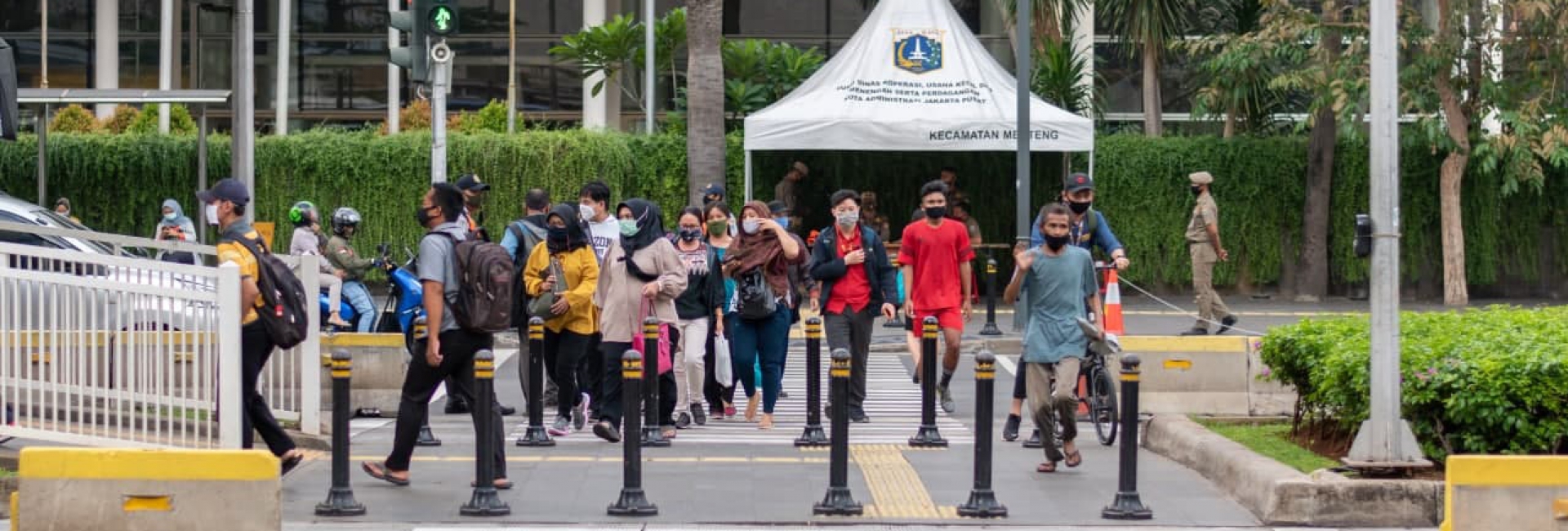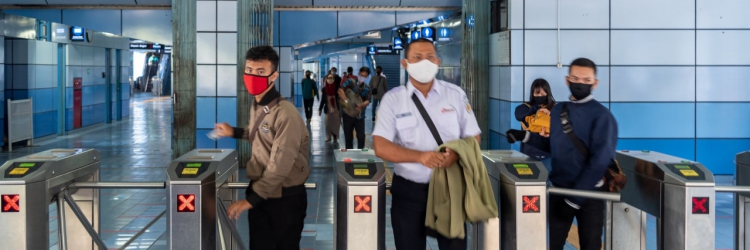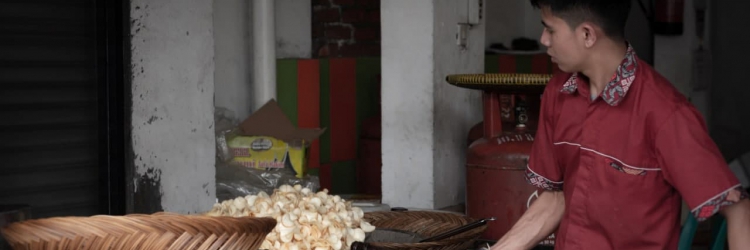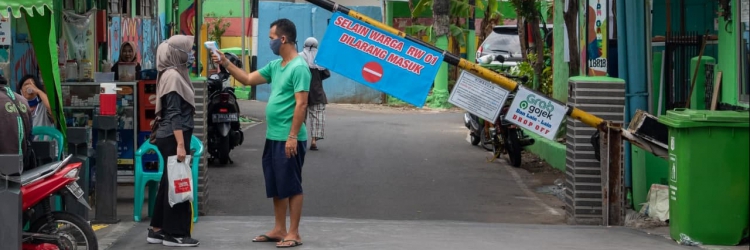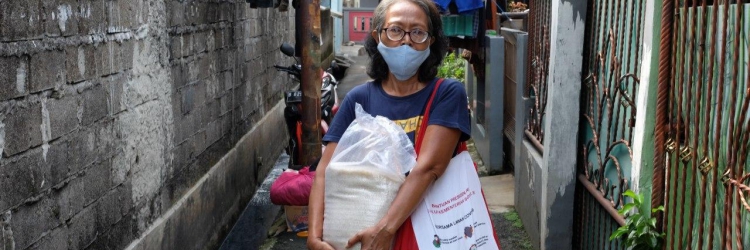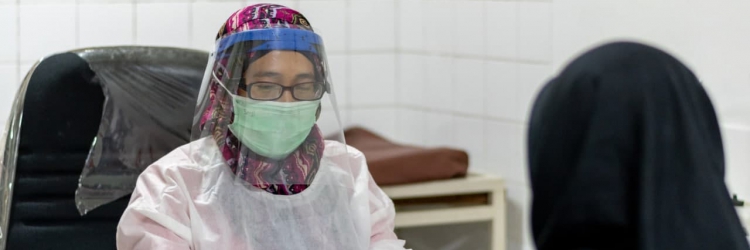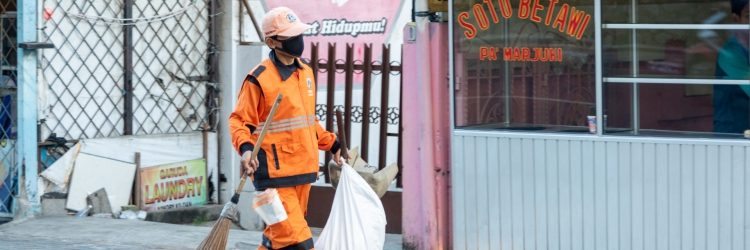Highlights:
- Handing over the implementation of the PSBB policy to regional governments is inconsistent with the concept of decentralization, which essentially only delegates authorities, rather than separates authorities, between the central and regional governments.
- Policy inconsistencies surround the implementation of the PSBB policy due to the varying interests between regional governments and between the central and regional governments.
- The COVID-19 Response Acceleration Task Force fails to mediate the policy inconsistencies because they have no authority to do so.
The COVID-19 pandemic teaches us a valuable lesson on how to manage the so-called health emergency. The implementation of the Large-Scale Social Restrictions (PSBB) policy that uses the scenario of delegating the authorities between the central and regional governments has been hampered with challenges. The effectiveness of this policy is tested when the pandemic has escalated beyond regional authority. What will be the possible scenario of the PSBB policy implementation? Who should resume the authority over its implementation?
The PSBB has been imposed by the government since 31 March 2020 through Government Regulation (PP) No. 21/2020 on Large-Scale Social Restrictions to Accelerate the Mitigation of Coronavirus Disease 2019 (COVID-19). According to Law No. 6/2018 on Health Quarantine, which serves as the reference for this government regulation, the restriction set forth by the regulation involves (i) closing schools and workplaces, (ii) restricting religious activities, and (iii) restricting activities in public places or facilities.
Looking back, the issuance of this government regulation seemed to be the answer to the emerging situation during the early phase of the pandemic in Indonesia. On the one hand, the regulation was a way to end the polemic and address criticism towards the effectiveness of the government’s appeal for the people to stay at home—a policy that has neither clear legal foundation nor sanction. On the other hand, the regulation was also meant to put in order the policies independently implemented by regional governments to curb the spread of COVID-19. For instance, both Tegal and Surakarta governments had once implemented local lockdowns in their regions.
“With the issuance of this government regulation, everything is clear. I ask that all regional leaders to not make uncoordinated policies. All regional policies must comply with the regulation and in accordance with the law, government regulation, as well as presidential decree.” (President Joko Widodo, setkab.go.id, 31 Maret 2020)
With this statement, the president emphasized that the central government has the authority over policies to handle COVID-19. However, looking at the substance of the regulation and its implementation, the central government only has authority over declaring PSBB status, with the decision to start, extend, or end this PSBB being in the hands of the regional governments.
On paper, the PSBB policy that hands over the authority to regional governments seems to be an ideal scenario in mitigating the non-health after-effects of the pandemic. However, after monitoring the media from 21 April 2020 to 4 June 2020, it was found that there are at least two main problems in the policy implementation. On the one hand, policies among regions are not synchronized, especially in regions located within the COVID-19 pandemic epicenters. On the other hand, synchronizing policies between the central and regional governments is a challenge due to the different perspectives and stands in the technical aspects of PSBB implementation.
Inconsistent PSBB Policies between Regional Governments
The PSBB policy implementation highly depends on considerations made by every regional leader. In reality, regional governments’ decisions are not solely based on epidemiological considerations. They are instead based on the regional governments’ financial capabilities, particularly in ensuring the fulfilment of people’s basic needs and implementation of social safety net.
The technical arrangements of the PSBB policy are stipulated in Ministerial Regulation of Health (Permenkes) No. 9/2020 signed on 3rd of April 2020. Article 4 of this regulation states that in addition to epidemiological considerations, any regional leader that propose to implement PSBB must also make sure that they are prepared to fulfill the basic needs of their people, and have sufficient health facilities and infrastructure, budget and social safety net, and security. Meanwhile, the epidemiological considerations stipulated in the ministerial regulation include data on (i) increase in the number of cases by time, (ii) spread of cases by time, and (iii) local transmissions.
Based on these provisions, most regional leaders whose regions were located within the COVID-19 pandemic epicenters proposed to implement PSBB at the same time. For instance, regions in the Jakarta, Bogor, Depok, Tangerang, and Bekasi (Jabodetabek) area simultaneously proposed to implement PSBB policy almost in the same period, i.e., mid-April 2020. This is also the case in Surabaya and two kabupaten (districts) in the East Java epicenter, Kabupaten Gresik and Kabupaten Sidoarjo, where PSBB was concurrently implemented at the end of April 2020.
However, the bupati (head of the kabupaten) of Maros was reluctant to implement PSBB despite the region being a part of the South Sulawesi’s COVID-19 epicenters. According to South Sulawesi Governor Nurdin Abdullah, President Joko Widodo had advised Kabupaten Maros to implement PSBB to curb the spread of COVID-19 in South Sulawesi. Meanwhile, its neighboring cities such as Makassar and Kabupaten Gowa have already implemented PSBB.
Two reasons were behind the bupati of Maros’s reluctance to implement PSBB. First, the implementation of PSBB in Makassar was deemed ineffective because of the high number of vehicles from Makassar travelling on the Makassar-Maros road. Second, Kabupaten Maros was unprepared to allocate its budget for social assistance package as part of the requirement to implement the PSBB policy.
“We are still examining how Makassar and Gowa implement the PSBB policy. Right now, people are more afraid of not receiving staple food assistance, rather than [getting infected by] corona, that’s the fact." (Hatta Rahman, bupati of Maros, tribun-timur.com, 28 April 2020)
No statements or actions were taken by the Ministry of Health regarding to the bupati of Maros’ decision even though based on the regulation, the minister for health has the authority to determine which regions should implement PSBB. The Indonesian national COVID-19 Task Force did nothing either, even when they have the right to provide feedback to the minister for health to determine regions where PSBB should be implemented. This shows that not only was the president’s request ignored by the bupati, it was also not followed through by his aides.
Even though the bupati of Maros did not formally implement the PSBB, the policy he launched was essentially not that far off from the arrangements in those regions that implemented PSBB. In this kabupaten, schools and businesses were closed, religious activities and people’s movement were restricted, traffic restrictions at the border were increased, and public facilities, such as parks and tourist spots, were also closed to prevent crowds.
The same story is repeated in West Sumatra and Bali. To slow down the increase in their COVID-19 positive cases, the two provinces took two completely different approaches, i.e., implementing PSBB or not implementing it at all. The West Sumatra Government decided to implement PSBB at the provincial level. One of the reasons was to allow the provincial government to implement the Ministerial Regulation of Transportation (Permenhub) No. 25/2020 that bans people from entering and leaving regions where PSBB were implemented. In other words, West Sumatra considers PSBB necessary to prevent migrants or homecoming travellers with a potential of bringing in the virus.
On the other hand, the Bali Government holds the view that PSBB is required only if the COVID-19 infection was caused by local transmission. This is because PSBB is a policy that restricts the activities of the people in the region. The Kota (City of) Denpasar Government’s proposal to implement PSBB was rejected by the provincial government. In various news reports, Bali Governor I Wayan Koster, repeatedly stressed that the COVID-19 cases in his region were dominated by imported cases. Therefore, the strategies to be implemented should also be different. Using this argument, the policy the provincial government implements is monitoring and carrying out tight restriction on the mobility of people coming to Bali, without having to implement PSBB.
However, Bali also essentially restricts its people’s mobility. The difference is that Bali utilizes the authority of customary village communities. Thanks to this approach, the restriction on people’s ingoing and outgoing mobility is implemented at the village level.
“Because customary villages have customary law, people are more disciplined. So far, it has been going really well. Besides that, customary villages also have a religious rite known as niskala. The ancestors taught them that a plague can be handled using a separate rite." (I Wayan Koster, Bali governor, cnnindonesia.com, 12 Mei 2020)
Furthermore, the role of customary villages is also optimized as some of their assets are used for social assistance. The Bali Government has instructed that the 2020 Customary Village Fund is used for handling the COVID-19 pandemic and providing social assistance. Meanwhile, in several kabupaten, customary village-owned village credit institutions (LPD) also allocate their business profits for social assistance.
The policy scenario that heavily depends on each region’s decision has made every regional government implement PSBB on their own pace. Both regions that implement PSBB and those that do not are deemed successful in curbing the spread of COVID-19. However, towards the end of the policy implementation in both groups, positive cases were still fluctuating and have not shown any signs of decreasing. In Bali, the discovery of new positive cases have gone back up and increasingly dominated by local transmission, while in Surabaya, the number of positive cases has soared. Because of how it is implemented, it is difficult to measure the effectiveness PSBB as a national policy.
Conflict of Interests between Central and Regional Governments
The Jabodetabek area, which was the first region to implement the PSBB policy, have a different story. Challenges in the effectiveness of PSBB implementation came not from the policy inconsistencies among regions considering every regional government implemented the PSBB simultaneously. The challenges instead came from the contradictory policies between the regional governments and several ministries. This messy implementation of the PSBB policy can be seen from the overlapping authorities and conflict of interests between both sides. Even though regional governments are granted a significant role by Government Regulation No. 21/2020, they are unable to control several sectors because those sectors fall under the authority of the central government.
One of the constantly emerging topics in the media is the call to stop the operation of commuter lines within Jabodetabek area. It is recorded in the media that this issue has been put forward three times by the regional leaders of Jakarta and West Java. The first appeal was in mid-April 2020 during the early phase of PSBB implementation in Jabodetabek. The second one was at the end of April 2020 when the PSBB implementation was deemed ineffective as the number of cases was still high. Finally, the third appeal was in early May 2020 when three commuter line passengers were tested positive for COVID-19.
“Two days ago, I asked the minister for transportation ad interim to stop the commuter line operation during PSBB implementation.” (Anies Baswedan, Jakarta governor, kompas.com, 16 April 2020)
“The five of us, regional leaders, will still ask the Ministry of Transportation to temporarily halt the operation of commuter line during the PSBB implementation. We believe that one of the causes of the rampant positive cases is the commuter line. Based on the data, the infected are mostly commuter line passengers. The first case in Bojonggede is from the commuter line. At the very least, there should be some restriction, certain stations should be closed and people that will travel by commuter line should be selected.” (Ade Yasin, bupati of Bogor, cnnindonesia.com, 27 April 2020)
“It has come up again (halting commuter line operation), I also fully support it. The problem is in asymptomatic people. Even with the health protocol in place (in commuter line), these asymptomatic people would go undetected when they actually bring the virus with them.” (Ridwan Kamil, West Java governor, tempo.co, 9 Mei 2020)
However, all these appeals were rejected. In this case, Ministry of Transportation Regulation (Permenhub) No. 18/2020 only restricts the number of commuter line passengers and requires the implementation of the health protocol. Under this regulation, the commuter line’s operating hours would change to 06.00 am–6.00 pm. With this restriction, the Ministry of Transportation claimed that commuter line’s passengers had decreased by 80%–90% compared to that before PSBB.
“There is no urgency yet to stop the commuter line operation. Based on Ministry of Health Regulation [Permenkes] No. 9/2020, several sectors are exempted, such as health workers, security personnel, and several strategic institutions that require employees to come to the office. Many of them live around Jakarta. That is why the commuter line [service] is still needed. The most important thing is that we apply the health protocol. [Once it is applied] we can still provide services.” (Adita Erawati, Ministry of Transportation spokesperson, kompas.tv, 29 April 2020)
The high number of commuter line passengers was also contributed by the operation of those companies that are actually not in the list of exempted sectors in Jakarta Governor Regulation (Pergub) No. 33/2020. These companies still continue to operate because they have Operational and Mobility Permits (IOMKI) under Circular of the Minister for Industry No. 4/2020 on Factory Operations during the period of Public Health Emergency of the Coronavirus Disease 2019. The Ministry of Industry argued that the IOMKI was issued to prevent substantial business losses.
On 22 April 2020, Jakarta Governor Anies Baswedan requested the Ministry of Industry to review the IOMKIs given to those companies excluded from the list of exempted sectors. The Jakarta Government and the Ministry of Industry reportedly met for negotiation. However, during the negotiation, the Ministry of Industry kept on issuing more IOMKIs.
“Discussion is still ongoing. We do not understand why more permits are still issued. We questioned why we were not involved when they issue IOMKIs.” (Andri Yansyah, head of Jakarta Labor, Transmigration, and Energy Agency, ayojakarta.com, 6 Mei 2020)
Up until 29 April 2020 when the commuter line polemic peaked, the Ministry of Industry had issued IOMKIs for 14,533 companies. Most of these companies were in the agroindustry; the chemical, pharmacy, and textile industries; the metal, machinery, transportation, and electronic industries; the small, medium, and various industries; and industrial zones and services. The Ministry of Industry argued that the circular did not contradict the Ministerial Regulation of Health No. 9/2020.
“On appendix D, the implementation of large-scale social restrictions, page 24, requires a permit from the Ministry of Industry for the industrial sector that needs a continuous process (to operate)” (Achmad Sigit Dwiwahjono, secretary general of Ministry of Industry, detik.com, 29 April 2020)
Regarding the polemic on commuter line operation and IOMKIs, the institutions supposedly having the the main control in handling the COVID-19 pandemic seem to be indecisive. Both the Ministry of Health and the national COVID-19 Task Force tend to hand over these problems to the regional leaders without attempting to solve the problem of absence of policy synergy. This is despite the fact that according to Presidential Decree (Keppres) No. 7/2020, the national COVID-19 Task Force is tasked with improving policy synergy between ministries/institutions and regional governments in dealing with the COVID-19 pandemic.
“Many workers still work from the office. We have appealed, reprimanded, and we hope the task force (at the regional level) is firmer towards the companies that have not complied with the health protocol." (Doni Monardo, head of the national COVID-19 Task Force, kompas.com, 20 April 2020)
“The regional governments surely understand the dynamics of the people in their regions. Therefore, PSBB arrangements are left entirely in the hands of the regional leaders who issue the regulations." (Achmad Yurianto, government spokesperson for COVID-19 mitigation, bisnis.com, 4 May 2020)
The Ministry of Industry’s policy to grant operational permits to companies excluded from the list of exempted sectors has resulted in several clusters of COVID-19 transmission in factories. In Cikarang, Kabupaten Bekasi, two factories had to be shut down because some workers’ rapid tests showed reactive results and one person who was tested positive died. Meanwhile, in Kecamatan Rungkut, Surabaya, one cigarette factory was also closed down after two workers died due to COVID-19 and a hundred others were tested reactive after taking a rapid test.
In order to avoid more COVID-19 transmission in factories, the Ministry of Industry only issued Circular No. 8/2020 on Reporting the Obligation for Industrial Companies and Companies in Industrial Zones that Have IOMKIs
“During the PSBB implementation, we require industrial companies that have IOMKIs to submit an online report once a week.” (Agus Gumiwang Kartasasmita, minister for industry, beritasatu.com, 9 Mei 2020)
The regional leaders in Jabodetabek area eventually made a move using the authority they had. They simultaneously applied a regulation that requires every commuter line passenger to bring an assignment letter. Only those working in the exempted sectors and can show their identity with an assignment letter are allowed to ride the commuter line.
“You are allowed to ride the commuter line as long as you have that (assignment letter). If you do not have the letter, you are a not allowed to ride the commuter line and might even be sanctioned.” (Bima Arya, kota (city) head of Bogor, kompas.com, 11 Mei 2020)
The polemic in the PSBB implementation in Jabodetabek area is rooted in the overlapping authorities between the central and regional governments. It is unfortunate that the national COVID-19 Task Force fails to mediate it as they are the one tasked with synergizing COVID-19-related policies. The national COVID-19 Task Force seems reluctant because they do not have any authority over the problem. In Presidential Decree No. 9/2020, the national COVID-19 Task Force is only authorized to accelerate permits to import goods to be used for handling COVID-19.
Passing the Buck Needs to End
The lack of coordination among regions and the tug of war of policies between the central and regional governments are the results of the PSBB scenario. Handing over the authority to regional governments led to complications in its implementation. Instead of making measures to handle the COVID-19 pandemic more effective, it only caused chaos because each party involved wanted to serve its own interest.
Handing over the authority to the regional governments in handling the COVID-19 pandemic is actually quite inappropriate. The principle of decentralization in Indonesia is delegation, not separation, of authority. The regional governments’ authorities are limited by (i) regional administrative boundaries and (ii) the central government as the highest authority in Indonesia. Meanwhile, the COVID-19 pandemic has spread beyond the authority and administrative boundaries of the regions.
Learning from the implementation of the PSBB policy in various regions over the last four months, the responsibility for the management of disaster, including the COVID-19 pandemic, must be restored to the central government. This is necessary because it will ensure that the national-level policies are unified to allow the process to run effectively. Furthermore, Law No. 6/2018 on Health Quarantine that serves as the foundation of the PSBB policy sets forth that the authority to implement a health emergency response is held by the central government.
In this case, the position of the national COVID-19 Task Force as the institution tasked with accelerating the handling of the COVID-19 pandemic must be emphasized. The task force’s current functions must be equipped with several authorities that could empower them to solve polemics or disputes. Without a clear authority, the national COVID-19 Task Force is powerless against the invisible coronavirus.


